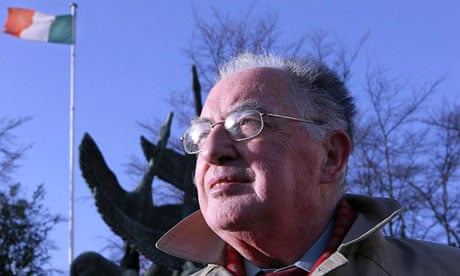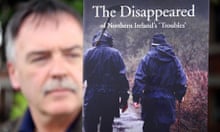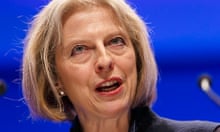Ruairi O'Bradaigh, a former IRA chief of staff and one of Irish republicanism's most longstanding hardliners, has died aged 80.
The party he founded from a split in Sinn Féin in 1986 said he died on Wednesday in Roscommon hospital in the Irish Republic.
A lifelong, uncompromising republican, O'Bradaigh experienced two major splits within the IRA.
The first came when the movement divided in 1969/70, producing the rival Provisional and Official wings.
The second came after the bulk of Sinn Féin decided to take their seats in the Irish Republic's parliament in 1986.
O'Bradaigh spent the second half of his life denouncing former comrades as sellouts and traitors to the purist aims of a united Ireland or nothing.
Following the murder of two British soldiers outside a County Antrim army barracks in 2009 and the killing of a police constable shortly afterwards in County Armagh, O'Bradaigh predicted there would be a resumption in violence by groups opposed to the peace process.
In an interview with the Observer in March 2009, a week after the three killings, O'Bradaigh angrily dismissed Martin McGuinness, an ex-comrade turned deputy first minister of Northern Ireland, for describing the gunmen behind the murders as "traitors to the people of Ireland".
The one-time president of both Sinn Féin and, later, the hardline Republican Sinn Féin said: "When I heard it, I thought immediately 'Who is the traitor?'
"Is it those who just behave as they always behaved and believe sincerely as they always believed in republican struggle?
"Or are they the people who turned their coats like McGuinness, accepted British rule, destroyed the arms, who said they would never accept a Unionist veto and now have done so? In my view, McGuinness has abused words."
In the same article, one of his last ever interviews with a British newspaper, O'Bradaigh said: "As long as the British remain in a part of Ireland, there will always be some kind of IRA to stand up to them."
The former Republican Sinn Féin leader, who founded the organisation during a split from Gerry Adams and his supporters 23 years ago, had remained unbending in his support for those who choose to take up arms.
There are two main organisations offering what O'Bradaigh termed "armed resistance" to the political settlement in Northern Ireland – the Continuity IRA and now the new IRA.
CIRA grew out of the split in 1986 and regards itself as the more ideologically pure, true inheritor of the republican tradition.
Both organisations though have one thing in common. They believe that Sinn Féin's participation in a power-sharing devolved government still ultimately dependent on the UK amounts to a "sellout" of republican principles.




